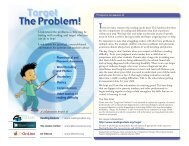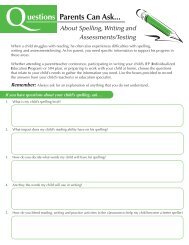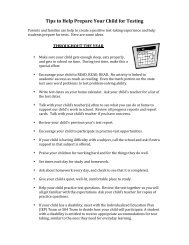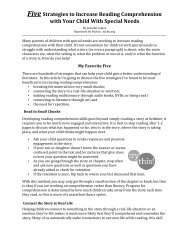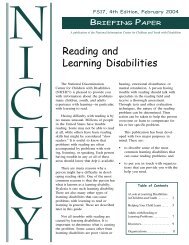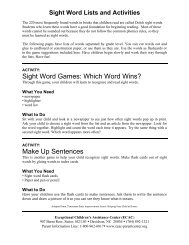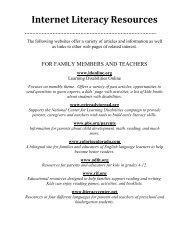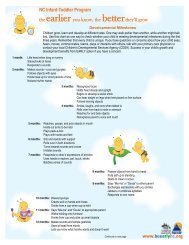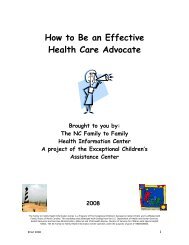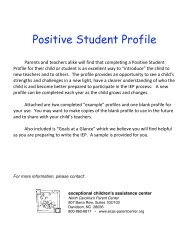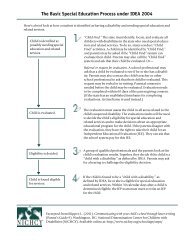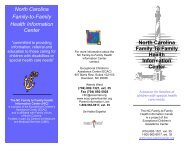Questions Parents Can Ask About Literacy and Reading
Questions Parents Can Ask About Literacy and Reading
Questions Parents Can Ask About Literacy and Reading
You also want an ePaper? Increase the reach of your titles
YUMPU automatically turns print PDFs into web optimized ePapers that Google loves.
uestions<br />
<strong>Parents</strong> <strong>Can</strong> <strong>Ask</strong>...<br />
<strong>About</strong> <strong>Reading</strong> Improvement<br />
When you are the parent of a child who struggles with reading, you need<br />
specific information to support your child’s reading progress. Whether<br />
attending a parent/teacher conference, participating in writing the IEP (Individualized Education<br />
Program), or working with your child at home, use the questions that relate to your child to<br />
gather the information you need. Use the boxes provided to record the answers from your<br />
child’s teacher(s) or education specialist.<br />
Remember: Always ask for an explanation of anything that you do not underst<strong>and</strong>.<br />
If you have questions about your child’s overall reading progress, ask. . .<br />
1. What is my child’s grade level in reading? What does that mean he can do?<br />
2. In what areas does he need to improve?<br />
3. Is there a difference between how well my child reads individual words <strong>and</strong> how well he underst<strong>and</strong>s what he reads?<br />
If so, what can we do to improve the weaker areas?<br />
4. What strategies are you using to improve/build my child’s vocabulary? How will you measure my child’s progress?<br />
5. What specific things are you doing in the classroom to help my child improve in reading? (such as: provide support<br />
by a reading specialist, provide different materials, provide instruction in small groups that targets my child’s<br />
particular weaknesses or provide extra time to practice reading during the day)
6. What can I do at home to help my child read better? (For example: <strong>Can</strong> you suggest specific activities that we can<br />
do, materials that I may borrow, available website supports or workshops that I can attend?)<br />
7. How will I be notified about my child’s reading improvement? What will the report look like? Would you be willing<br />
to update me every 2-3 weeks?<br />
If you have questions about Sounds, Word Recognition <strong>and</strong> Fluency, ask . . .<br />
1. Has my child ever been tested/assessed for sound <strong>and</strong> letter/sound awareness? If so, when <strong>and</strong> what did the results show?<br />
2. Have you tested/assessed my child’s fluency? If so, when <strong>and</strong> what did the results show?<br />
3. How <strong>and</strong> how often do you measure/assess my child’s fluency progress?<br />
4. What are you doing in the classroom to help my child decrease her need to pause at words <strong>and</strong> increase her ability<br />
to read smoothly?<br />
5. What strategies are you teaching my child to help her work through difficult sounds or words when reading?
6. What are some specific rhyming activities, word games, poems, books, videos, audio materials, etc. that I can use at<br />
home to help my child with sounds, word recognition <strong>and</strong>/or reading aloud?<br />
7. For practicing reading at home, would you help me select material(s) that my child can read comfortably (in other<br />
words, where 95% of the words are ones that she knows)?<br />
If you have concerns about your child’s <strong>Reading</strong> Comprehension, ask. . .<br />
1. Is my child having trouble underst<strong>and</strong>ing what she reads? If so what do you do to help her underst<strong>and</strong> that material?<br />
2. Have you tested/assessed my child’s reading comprehension? Is so, when <strong>and</strong> what did the results show?<br />
3. How <strong>and</strong> how often do you measure my child’s comprehension progress?<br />
4. Would you show me what you are doing?<br />
5. <strong>Can</strong> you tell me about some other activities that I can do at home to help her underst<strong>and</strong> what she reads?<br />
6. What resources can you give me to use at home to help my child?
7. What kinds of activities can we do before <strong>and</strong> after my child reads to help her underst<strong>and</strong> the information?<br />
If you have questions about <strong>Reading</strong> Support(s) for your child in other subject areas, ask. . .<br />
1. What specific things are my child’s teachers doing to support <strong>and</strong> help him with his reading, writing <strong>and</strong>/or<br />
spelling needs?<br />
If your child has an IEP (Individualized Education Program) or a 504 plan, ask. . .<br />
1. What specific accommodations does my child need in each academic <strong>and</strong> special area class to support his reading,<br />
writing <strong>and</strong> spelling needs?<br />
Remember:<br />
If your child is unable to read on grade level, it is essential to think<br />
about <strong>and</strong> discuss ways to work around his reading difficulties so that<br />
he can access general curriculum content. You need to make sure that<br />
the methods of addressing all literacy needs in every subject area are<br />
specifically described in your child’s IEP.<br />
For students needing special education in reading, the IEP MUST<br />
include specific, measurable reading goals, as well as all specific<br />
reading supports needed in every other subject area.<br />
All information <strong>and</strong> support provided at no cost to families!<br />
For more information, please contact:<br />
www.ecac-parentcenter.org<br />
For more information, please contact:<br />
ecac (exceptional children’s assistance center)<br />
907 Barra Row, Suites 102/103 | Davidson, NC 28036<br />
phone: 704-892-1321 | 1-800-962-6817 (parent info line)<br />
www.ncsip.org<br />
Funding has been provided by The North Carolina State Improvement Project, Public Schools of North Carolina, Exceptional Children Division | November 2012



